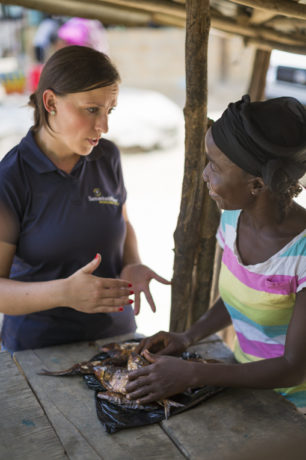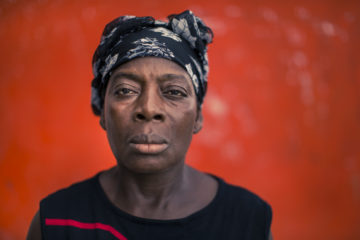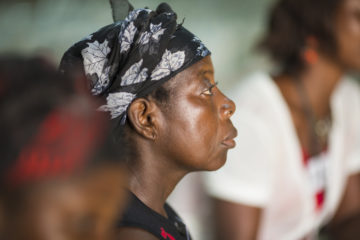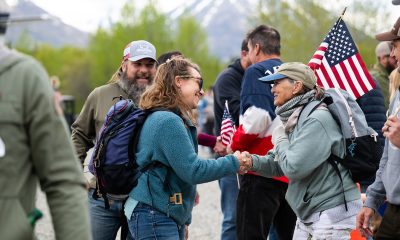Samaritan’s Purse cares for those left behind by the deadly disease
Even after the Ebola crisis ended in Liberia, the pain lingered. People returned home from the Ebola Treatment Units to find that their belongings had been taken from their homes and burned. Many found that friends and family had deserted them. Some found that their landlords wouldn’t allow them to return to their homes at all, and they were exiled from their communities.
Life became harder not just for survivors but also for the family members and friends who were left behind. Widows, especially, faced hardships that they didn’t expect.
“Once husbands died, everything rested all of a sudden on their shoulders,” said Daniela Spevak, Samaritan’s Purse program manager. “They’re trying to gather themselves together and start again on their own. Because of Ebola, people are afraid to talk to them, and a lot of people just abandoned them.”
Widows who anticipated support from their communities were faced with rejection, and they were left to support themselves and their children on their own. For many, this task felt impossible because they didn’t have skills to enter the workforce.
“Ebola Reduced My Life”
When Esther Tarr’s husband and childhood sweetheart got sick, he didn’t know why. He took medicine but didn’t improve. Esther suspected that he had Ebola and sent her five children to stay with her brother in the countryside. Her suspicions were correct, and her husband died at home.
Then Esther got sick, and she went to the Ebola Treatment Unit. Unlike her husband, she lived. But, like many others, she returned home to a landlord who told her she had to leave. Someone had taken all her belongings.
Esther’s sister-in-law sent her children back to her, so she had to find somewhere for them to live. She moved in with her sister, but even within her own family, she was mistreated. Her sister doesn’t speak to her or share food or other necessities. Esther couldn’t bear to see her children suffer, so she sent the three youngest to live with her brother again.
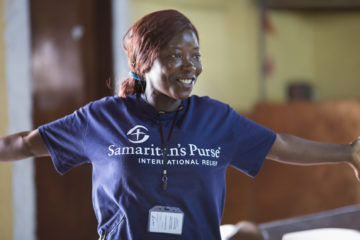
The counselor for the widows’ project shares Christ’s love with each of the widows during her lessons.
It wasn’t until Esther felt completely hopeless that she saw a glimmer of light. While she was at the survivors’ clinic one day, the doctor asked if she had any help. When Esther told the doctor her story, her name was passed to Samaritan’s Purse for enrollment in a widows’ project.
“For me, Ebola has reduced my life to a point where I’m just beginning to be hopeful,” Esther said. “My life was not that wonderful, but compared to what my life is now, when I see myself now, I say, ‘Is it possible for anything better to come out of me again?’ I’m now beginning to have hope. I’m now beginning to have some light.”
Comfort in Numbers
In the classes, Esther met other Ebola widows, like Christiana Scotland. Christiana’s husband was a doctor in the Ebola Treatment Unit and was infected by a patient. When he died, she was two months pregnant with their fifth child. She was kicked out of her home by her landlord and had to find a new place to live with little money.
“I would sit and cry and say, ‘Oh God, why did this happen in my life and my children’s life?’” she said.
Esther and Christiana have found comfort among other widows who face similar challenges. The classes are held at a local church, and 15 women attend each session. For the first six months, the women are being counseled in a group setting. The counseling comes from a Christian perspective, providing hope through Christ.
“I told God, ‘Where are you? If you are good, if you are there, why did you allow this to happen to me?’” Esther said. “After all this teaching and learning, I realized that you can’t get angry at God. After all of the teaching, I’m going back to church. I’m trying to understand that God is all-wise. He knows why He allowed whatever has happened to me to happen.”
At the end of the meetings, the women receive food to sustain their families. For some of the women, including Esther, this is the only food they are able to gather.
For the second six months of the program, the women will receive livelihood training so that they will be able to provide for their own families.
“Tomorrow, our life will not be the same,” Christiana said. “We will empower ourselves.”
This hope for the future has given the women the strength they need to continue supporting themselves and their children. Esther is hopeful that her new skills will allow her to move out of her sister’s house and to reunite with her children.
“God has brought Samaritan’s Purse,” she said. “So even when I go back home and have a feeling to cry and I think about what’s happening, I wipe my tears and become hopeful again.”

